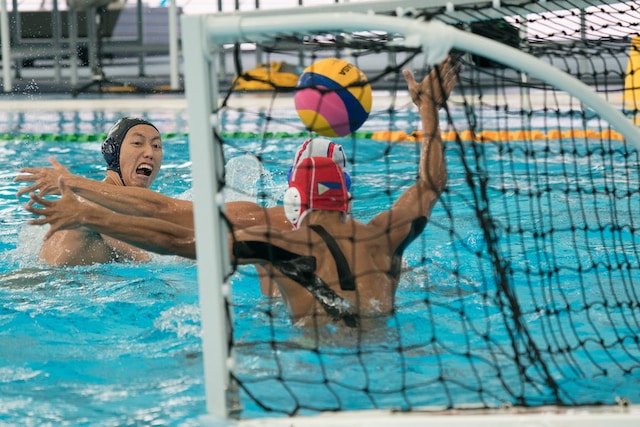If you’re a beginner looking to get into water polo, you might be wondering if this sport is as hard as it looks. With its fast-paced gameplay, intense physical demands, and complex rules, it’s natural to feel a bit intimidated. But fear not! In this article, we’re going to explore the question of whether water polo is hard for beginners.
We’ll take a look at the basics of the game, the skills you’ll need to master, and the challenges you’re likely to face as a newcomer to the sport.
Whether you’re a swimmer looking to try something new or simply curious about what water polo entails, get ready to dive in and discover whether this sport is right for you.
Why water polo may be hard for beginners
Water polo is undoubtedly a challenging sport, and it’s not uncommon for beginners to struggle with some of the basics. One of the main challenges for newcomers is simply getting used to the water.
Unlike other sports, water polo is played entirely in the pool, which means that players need to be comfortable swimming and treading water for extended periods of time. This can be a difficult adjustment for those who are used to playing on dry land.
Another challenge for beginners is mastering the various skills required for the game. Water polo involves a combination of swimming, passing, shooting, and defending, all of which require a high level of skill and coordination. In addition, players need to be able to think quickly and make split-second decisions in the heat of the moment.
Despite these challenges, however, water polo can be a highly rewarding sport for beginners. With practice and dedication, even those who are new to the game can develop the skills and confidence needed to succeed.
One of the best ways to get started is to join a beginner’s league or take lessons from an experienced coach. This can provide a supportive and structured environment in which to learn the basics and build your skills.
Basics of Water Polo
Water Polo Overview
Water polo is a pool-based team sport, with the objective of outscoring the opposing team. A team comprises seven players, including a goalkeeper, and the game is played in four quarters, each lasting eight minutes.
During the game, players use a combination of swimming, treading water, and ball handling skills to move the ball around the pool and score goals.
Rules of the Game
Water polo has several rules that players must follow. Some of the most important rules include:
- Players cannot touch the bottom of the pool or the sides of the pool during play.
- Players cannot hold the ball with two hands, except for the goalkeeper.
- Players cannot use their free hand to push or hold other players.
- Players cannot impede the movement of other players by grabbing, holding, or pulling them.
- Players can only hold the ball for a maximum of three seconds before passing or shooting.
In addition to these rules, there are several fouls that can result in a penalty or ejection from the game. These include hitting, kicking, or striking another player, intentionally splashing water in another player’s face, and using abusive language or gestures.
Overall, water polo can be a challenging sport for beginners due to the physical demands and complex rules. However, with practice and dedication, players can develop the skills and knowledge needed to become successful in the sport.
Skills Required for Water Polo
Swimming Abilities
To play water polo, you need to have strong swimming skills, particularly in freestyle, breaststroke, and backstroke. You should be able to swim efficiently while carrying the ball and making quick changes in direction.
In addition to swimming speed, you will need to have a good start, turn, and streamline technique. Water polo players need to be comfortable in deep water, even when being pushed down or wrestled with.
Ball Handling Skills
Another essential skill for water polo is ball handling. You must be able to control the ball with one hand while swimming and using the other hand to fend off defenders.
You should be able to pass the ball accurately and quickly to your teammates, shoot the ball with accuracy and power, and catch the ball with ease. Ball handling skills require practice, and beginners should focus on improving their technique through drills and exercises.
Endurance and Stamina
Water polo is an arduous sport that demands a high level of endurance and stamina.. You must be capable of swimming continuously for extended periods while frequently changing direction and making rapid movements.
You should have a good level of cardiovascular fitness to keep up with the demands of the game. Additionally, water polo players need to have strong legs, core, and upper body strength to move through the water and perform various techniques.
In conclusion, water polo requires a combination of swimming abilities, ball handling skills, and endurance and stamina. To become a proficient water polo player, you need to practice these skills regularly and work on improving your technique.
With time and effort, you can become a skilled water polo player and enjoy the challenges and rewards of this exciting sport.
Challenges for Beginners
Water polo is a demanding sport that requires a significant amount of endurance, strength, and agility. It also involves a lot of mental toughness as players must constantly be aware of their surroundings and make quick decisions. As a beginner, you may find yourself facing several challenges both physically and mentally.
Physical Challenges
One of the biggest physical challenges for beginners is the amount of swimming involved. Water polo requires a lot of swimming, which can be exhausting if you are not used to it. You will need to build up your endurance and stamina to keep up with the game.
Another physical challenge is the constant treading of water. This can be difficult for beginners who are not used to it and can cause fatigue in the legs. It is important to practice treading water and build up your leg strength to avoid getting tired quickly.
Finally, water polo is a contact sport and players often use physical force to gain control of the ball. This can be intimidating for beginners who may not be used to the physicality of the sport. It is important to learn the proper techniques for defending and attacking to avoid injuries.
Mental Challenges
Water polo not only requires physical strength but also mental toughness. As a beginner, you may find it challenging to stay focused and alert during the game. You will need to constantly be aware of your surroundings and anticipate the movements of your opponents.
Another mental challenge is the pressure of making quick decisions. Water polo is a fast-paced game and players must make split-second decisions on where to pass the ball or how to defend the goal. This can be overwhelming for beginners who may not be used to the speed of the game.
Finally, water polo requires a lot of teamwork and communication. As a beginner, you may find it difficult to communicate effectively with your teammates and understand their movements. It is important to work on your communication skills and build a strong team dynamic to succeed in the game.
Tips for Beginners
Water polo is a physically demanding sport that necessitates a combination of skills including swimming, passing, shooting, and treading water. If you are a beginner, it can be challenging to pick up these skills and get into the game. Here are some tips to help you get started:
Training and Practice Tips
One of the most important things you can do as a beginner is to focus on your swimming skills. Water polo requires a lot of swimming, so you need to be comfortable in the water and have good endurance. Consider taking swimming lessons or working with a coach to improve your technique and build your stamina.
Another key aspect of training is practicing your passing and shooting skills. These are essential for playing the game, and you should work on them regularly. Try to practice with a partner or a team to get used to passing and shooting while under pressure.
Finally, don’t forget to work on your treading water skills. This is an essential part of playing water polo, and you need to be able to tread water for long periods while passing, shooting, or defending. Practice treading water with your arms and legs, and try to stay afloat for as long as possible.
Mental Preparation Tips
Water polo can be a mentally challenging sport as well as a physical one. To prepare yourself mentally, try to stay focused and positive. Visualize yourself making successful passes and shots, and imagine yourself playing well in different game situations.
It’s also essential to stay calm and composed during games. Water polo can be a rough sport, and it’s simple to become frustrated or angry when things don’t go as planned. Try to stay level-headed and focused on the game, and don’t let your emotions get the best of you.
Finally, remember to have fun! Water polo is a challenging but rewarding sport, and it’s important to enjoy the game and the camaraderie of your teammates.
Conclusion
Ultimately, whether or not water polo is hard for beginners depends on a variety of factors, including your prior experience with swimming and other sports, your level of physical fitness, and your willingness to put in the time and effort to learn. But with the right mindset and approach, anyone can become a successful water polo player, regardless of their starting point.
It is also important to remember that water polo is a team sport, and your success depends on the performance of your teammates. You need to work together and communicate effectively to achieve your goals. You also need to be patient and persistent, as progress may come slowly at first.
If you are new to water polo, it is recommended that you start with basic drills and exercises to build your endurance and strength. You can also watch videos and read articles to learn more about the rules and strategies of the game. Joining a local water polo club or team can also be a great way to get started and meet other players.
Overall, water polo can be a challenging but rewarding sport for beginners. With the right mindset and approach, you can improve your skills and enjoy the many benefits that come with playing this exciting game.







